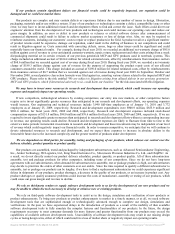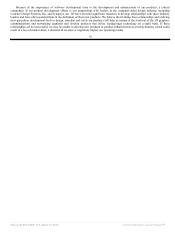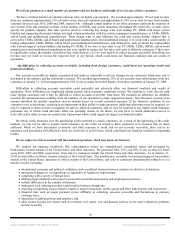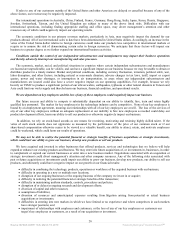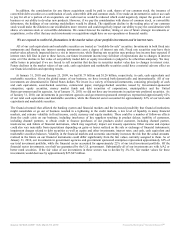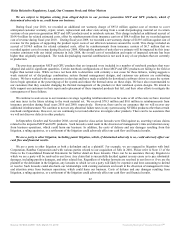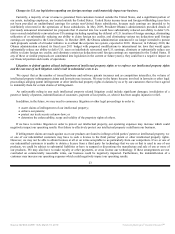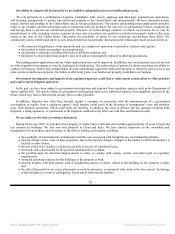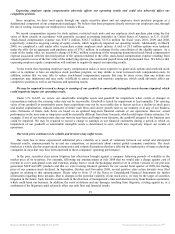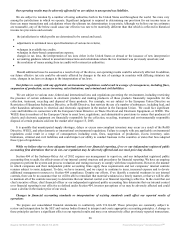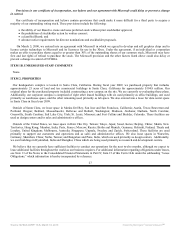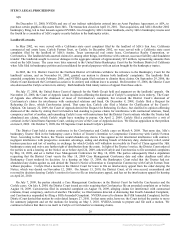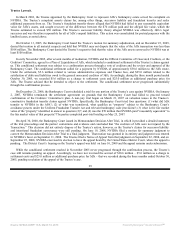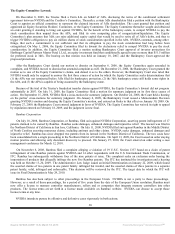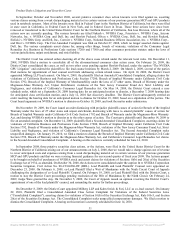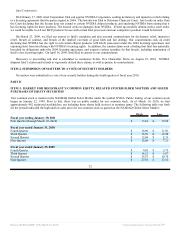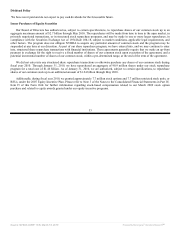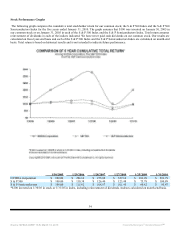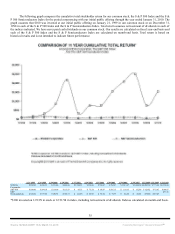NVIDIA 2010 Annual Report Download - page 38
Download and view the complete annual report
Please find page 38 of the 2010 NVIDIA annual report below. You can navigate through the pages in the report by either clicking on the pages listed below, or by using the keyword search tool below to find specific information within the annual report.
Our operating results may be adversely affected if we are subject to unexpected tax liabilities.
We are subject to taxation by a number of taxing authorities both in the United States and throughout the world. Tax rates vary
among the jurisdictions in which we operate. Significant judgment is required in determining our provision for our income taxes as
there are many transactions and calculations where the ultimate tax determination is uncertain. Although we believe our tax estimates
are reasonable, any of the below could cause our effective tax rate to be materially different than that which is reflected in historical
income tax provisions and accruals:
•
the jurisdictions in which profits are determined to be earned and taxed;
•
adjustments to estimated taxes upon finalization of various tax returns;
•changes in available tax credits;
•changes in share-based compensation expense;
•
changes in tax laws, the interpretation of tax laws either in the United States or abroad or the issuance of new interpretative
accounting guidance related to uncertain transactions and calculations where the tax treatment was previously uncertain; and
•
the resolution of issues arising from tax audits with various tax authorities.
Should additional taxes be assessed as a result of any of the above, our operating results could be adversely affected. In addition,
our future effective tax rate could be adversely affected by changes in the mix of earnings in countries with differing statutory tax
rates, changes in tax laws or changes in the interpretation of tax laws.
Our failure to comply with any applicable environmental regulations could result in a range of consequences, including fines,
suspension of production, excess inventory, sales limitations, and criminal and civil liabilities.
We are subject to various state, federal and international laws and regulations governing the environment, including restricting
the presence of certain substances in electronic products and making producers of those products financially responsible for the
collection, treatment, recycling and disposal of those products. For example, we are subject to the European Union Directive on
Restriction of Hazardous Substances Directive, or RoHS Directive, that restricts the use of a number of substances, including lead, and
other hazardous substances in electrical and electronic equipment in the market in the European Union. We could face significant
costs and liabilities in connection with the European Union Directive on Waste Electrical and Electronic Equipment, or WEEE. The
WEEE directs members of the European Union to enact laws, regulations, and administrative provisions to ensure that producers of
electric and electronic equipment are financially responsible for the collection, recycling, treatment and environmentally responsible
disposal of certain products sold into the market after August 15, 2005.
It is possible that unanticipated supply shortages, delays or excess non-compliant inventory may occur as a result of the RoHS
Directive, WEEE, and other domestic or international environmental regulations. Failure to comply with any applicable environmental
regulations could result in a range of consequences including costs, fines, suspension of production, excess inventory, sales
limitations, criminal and civil liabilities and could impact our ability to conduct business in the countries or states that have adopted
these types of regulations.
While we believe that we have adequate internal control over financial reporting, if we or our independent registered public
accounting firm determines that we do not, our reputation may be adversely affected and our stock price may decline.
Section 404 of the Sarbanes-Oxley Act of 2002 requires our management to report on, and our independent registered public
accounting firm to audit, the effectiveness of our internal control structure and procedures for financial reporting. We have an ongoing
program to perform the system and process evaluation and testing necessary to comply with these requirements. However, the manner
in which companies and their independent public accounting firms apply these requirements and test companies’ internal controls
remains subject to some judgment. To date, we have incurred, and we expect to continue to incur, increased expense and to devote
additional management resources to Section 404 compliance. Despite our efforts, if we identify a material weakness in our internal
controls, there can be no assurance that we will be able to remediate that material weakness in a timely manner, or that we will be able
to maintain all of the controls necessary to determine that our internal control over financial reporting is effective. In the event that our
chief executive officer, chief financial officer or our independent registered public accounting firm determine that our internal control
over financial reporting is not effective as defined under Section 404, investor perceptions of us may be adversely affected and could
cause a decline in the market price of our stock.
Changes in financial accounting standards or interpretations of existing standards could affect our reported results of
operations.
We prepare our consolidated financial statements in conformity with U.S.GAAP. These principles are constantly subject to
review and interpretation by the SEC and various bodies formed to interpret and create appropriate accounting principles. A change in
these principles can have a significant effect on our reported results and may even retroactively affect previously reported transactions.
26
Source: NVIDIA CORP, 10-K, March 18, 2010 Powered by Morningstar® Document Research℠


